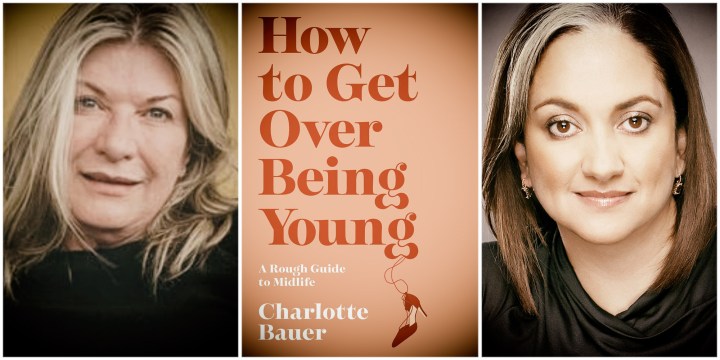DAILY MAVERICK WEBINAR
How to Get Over Being Young: A Rough Guide to life after 50

There are no hard and fast rules on how one gets to the other side of 50, says veteran South African journalist Charlotte Bauer, who recently released her first book – on navigating midlife in a world obsessed with youth.
Menopause. Award-winning journalist and author, Charlotte Bauer, hates that scientific, black-and-white technical term of age.
“It is so clinical, and it doesn’t really explain how interesting and complex this time of life is,” Bauer explained to Ferial Haffajee, a fellow veteran journalist and associate editor at Daily Maverick during a webinar.
Last year, Bauer, who made her name as a profile writer, columnist and editor, published her debut book, How to Get Over Being Young: a Rough Guide to Midlife, written through the lens of a 50-odd-year-old woman, navigating her wilderness years in a world obsessed with youth.
Haffajee sat down at the webinar with her friend and colleague to unpack her witty, irreverent book, well-received by many who row a similar boat to Bauer, who was whacked hard when she turned 50.
“It’s not just about the wicked-queen-mirror and the new wrinkles. It affects everything – your working life, your identity, your family life, friendship,” Bauer said.
The 50s hit women differently – some have a loss of confidence, influence and interest; and others, while they feel they still have something to offer, see that they are getting too old to be considered for “the juicy parts”, Bauer added
Bauer tells the side of this age-old story that science fails to tell: it’s really more about “reaching new places of acceptance, adventure and shifting focus more and more as [you] go along”, she stated frankly in the webinar.
According to Bauer, frankness was exactly what she hoped to reflect in her story, alongside the stories of other women – including the key characters of her fierce mother, rebellious auntie and three sisters – shared in the book.
“I thought I would write as honestly and unflinchingly as I could about what I was experiencing, without embarrassing my children any more than I had to,” Bauer said.
Ramaphosa gets ANC leadership re-election boost as ally wins Mpumalanga
Haffajee and Bauer worked together in the big city, Johannesburg, working for what was then The Weekly Mail. At the time, Bauer was arts and culture editor.
Bauer was “very much a part of sculpting that magnificent title at the time,” Haffajee described. “ She had her pulse on a lot of what has come to define and shape our culture.”
Later, the two journalists also worked together at City Press. But when 50 hit Bauer, it marked a serious change that rippled through all facets of her life: a vulnerable marriage; career shift; being bossed by her grown-up children; and, being the oldest person in a meeting.
Even her love for edgy Joburg suddenly morphed into something she needed to escape. “I found that as I got older, there was less to engage my interest. Things – harder to access. Places – harder to go too, “ she said.
Bauer left City Press and South Africa
“I had come to the end of my career, moved continents, my marriage was at a vulnerable stage – all of those things were cracking up faster than my face,” the author said. “It was a fairly significant moment.”
While Bauer, who was a Nieman fellow of journalism at Harvard University, didn’t miss the titles, prestige or conference rooms, at the start, she struggled to come to terms with life after resigning, and with being 50.
Suddenly, no one was paying her to get up and go to work, Bauer said, adding that her career had been much a part of her primary identity.
“Why so?” asked Haffajee, being the age of the great resignation.
“Rent!” Bauer responded quickly with a laugh. Then more seriously, “It made me feel more valued… I had to rethink my value to myself”, she said.
“That sort of end of my professional working life kind of coincided with me starting on this journey of midlife and thinking, well, what am I here for now?” Bauer said.
She found her answer in writing. “I still had it, and I could do something with it,” she said.
So, going grey became easier and easier for Bauer, she told Haffajee. “Now, I can’t imagine being back in the office.”
Bauer disclosed her reasons for leaving her country and escaping to the French countryside.
“Trapped; guilty; scared; bored” were the four words she listed to describe how she had felt about South Africa as she aged.
Bauer was in transit, she was clinging to the person she had known and at the same time watching another materialise in the mirror before her.
“I wanted to be left alone,” she said, quoting Audrey Hephburn. Being left alone was also what Bauer and her husband, who is referred to in the book as Husband, wanted when they both began to age. “Both going through changes, we wanted different views from different windows.”
“At last, I was alone. At last, I had been left alone. This is what I had wanted – wasn’t it?” Bauer reflected in the book after her husband leaves her in the South of France and he heads back to South Africa.
The irony is that being apart brought them closer together, Bauer said.
Haffajee listed some of the ways the book has been described: “funny”, “wise”, “as if a best friend is writing” and “vulnerable”. The latter, Haffajee remarked, was an achievement. “It is difficult to write vulnerability,” she said.
Bauer said the must-read chapter in the book was the one about hair. Initially, she had not thought her book, released by Penguin Random House, would expose her vulnerabilities. She credited much of the candour in the book to her agent, who helped her be more honest as she tried to reboot her life.
“[My agent] made me rewrite and rewrite this for two years after I delivered to her what I thought was more or less a complete manuscript… and she said – where is the shade? Where are the dark parts?” Bauer recalled. “This is not the sort of ‘haha – where are my glasses… whoops they’re on my head, hot flush’ [story about menopause] – it’s not a joke.” DM
To receive news about our upcoming webinars, sign up to the webinar newsletter.

















 Become an Insider
Become an Insider
It seems that two issues are conflated: getting old and retiring. Both are biggies (but wait till you get to 60!) and they tend to coincide, which amplifies both. But they are not the same thing. The one is easier to do something about than the other.